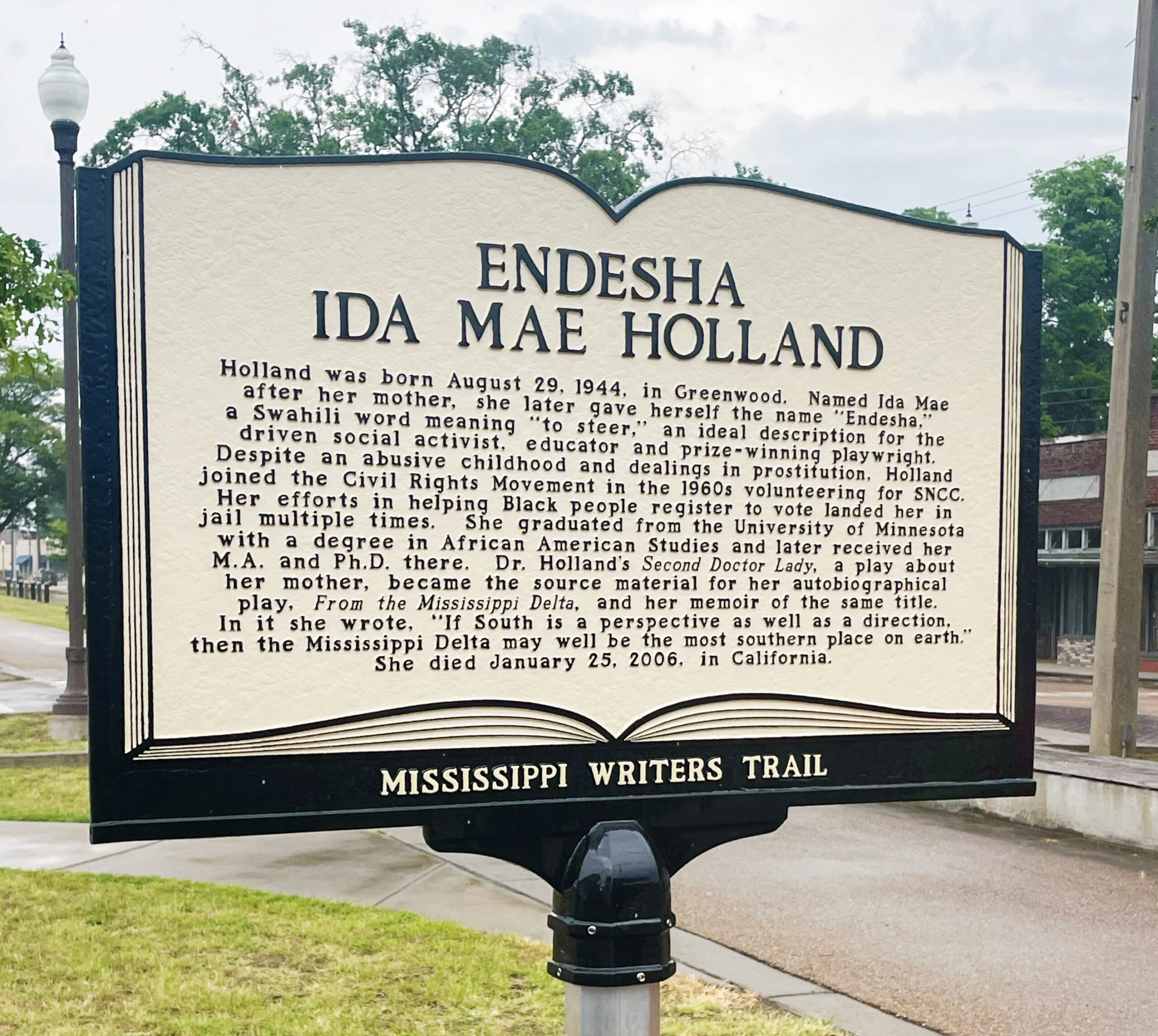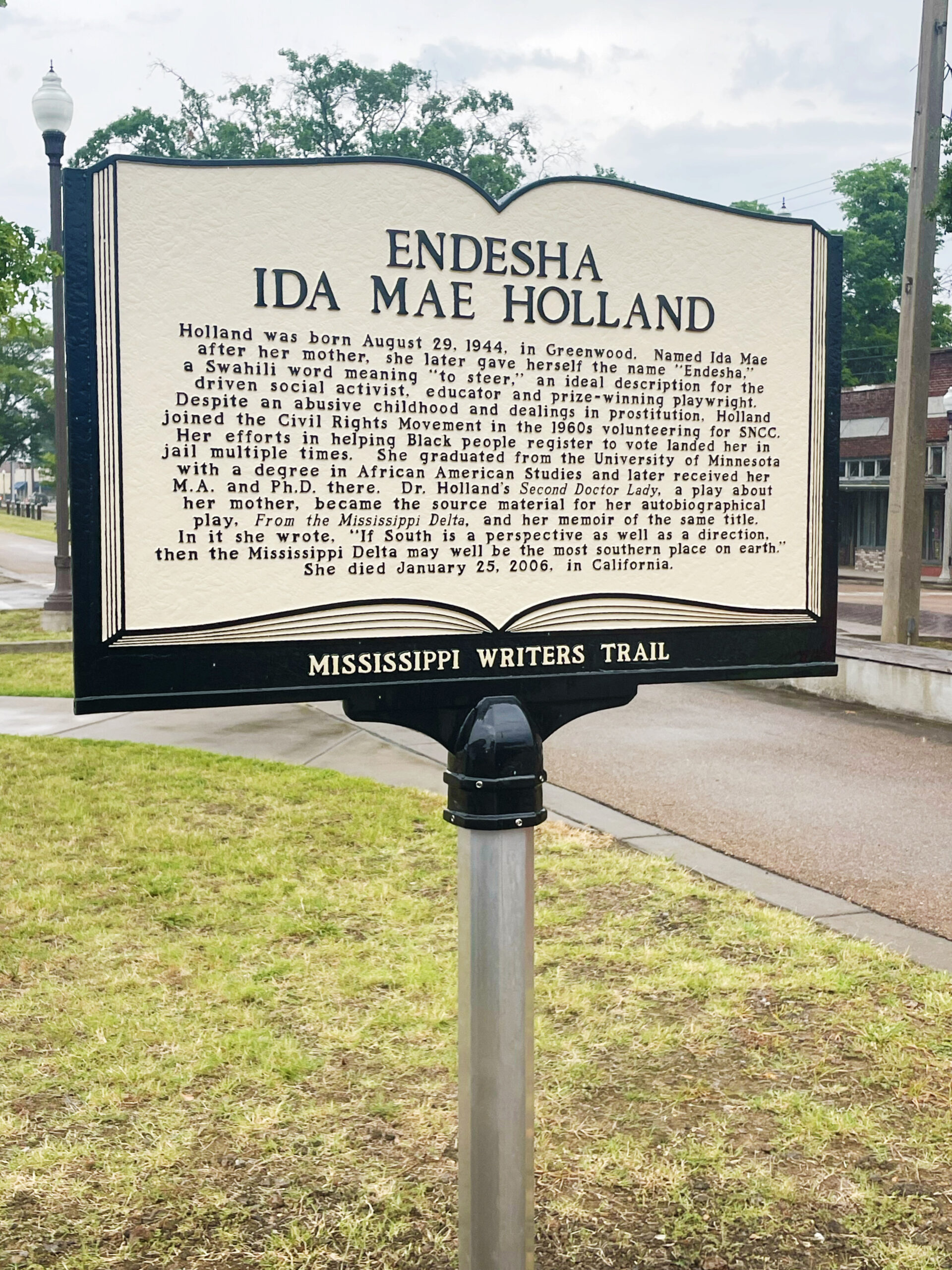Mississippi Writers Trail Unveils Marker Honoring Playwright and Activist Endesha Ida Mae Holland’s Enduring Legacy in Greenwood

On June 13, 2023, a Mississippi Writers Trail marker was unveiled at the Rail Spike Trail in Greenwood, Mississippi, honoring the artistic contributions of civil rights activist and author Endesha Ida Mae Holland. The marker serves as a testament to her lasting legacy and the significant impact she made on the literary and cultural scene of the state.

Greenwood Native & American Scholar, Playwright and Civil Rights Activist Endesha Ida Mae Holland, Ph.D
Endesha Ida Mae Holland – born on January 25, 1944, in Greenwood – experienced firsthand the challenges and hardships of growing up in the racially segregated South. Despite facing poverty and racial discrimination, she overcame every obstacle through determination and intellect. Holland’s life was changed when she joined the Civil Rights Movement in the 1960s and began volunteering with the Student Nonviolent Coordinating Committee in Greenwood – helping Black people register to vote. Her activism landed her in jail multiple times, but she fought on. Eventually, she earned a Ph.D. in American Studies from the University of Minnesota in 1986. She later became an American Studies professor at the State University of New York and a theater professor at the University of Southern California.
Holland is renowned for her six plays, with her autobiographical work, “From the Mississippi Delta,” receiving the most recognition. The play, which premiered in 1985, depicts her personal journey from poverty and abuse to empowerment and activism. It explores themes of racial identity, womanhood and social justice, resonating with audiences across the country. “From the Mississippi Delta” garnered critical acclaim and earned her a Pulitzer Prize nomination in 1988, solidifying her reputation as a gifted playwright.
“I had never read a book written by an African American. I didn’t know that Black people could write books. I didn’t know that Blacks had done any great things. I was always conscious of my inferiority, and I always remembered my place – until the civil rights movement came to the town where I was born and grew up.” – Endesha Ida Mae Holland, From the Mississippi Delta: A Memoir

Holland’s Pulitzer Prize-nominated work “From the Mississippi Delta” tells the story of her childhood in Greenwood during the 1940s
Throughout her career, Holland used her creative voice to illuminate the struggles and triumphs of African Americans, particularly women, in the face of systemic oppression. Her works addressed topics such as civil rights, poverty and the enduring legacy of slavery. By combining elements of autobiography, poetry and powerful storytelling, Holland skillfully captured the complexities of the African American experience in her own unique way.
 The Mississippi Writers Trail marker acknowledges Holland’s significant contributions to the literary world. As you follow along the trail, each marker shares the tale of a remarkable individual who shaped the narrative of the Magnolia State.
The Mississippi Writers Trail marker acknowledges Holland’s significant contributions to the literary world. As you follow along the trail, each marker shares the tale of a remarkable individual who shaped the narrative of the Magnolia State.
Notable figures, including Greenwood Mayor Carolyn McAdams, Mississippi State Senator David Jordan, Leflore County Supervisor Reginald Moore and Jeanette Cunningham Jones, a friend of the author, were present at the unveiling of Endesha Ida Mae Holland’s Mississippi Writers Trail marker on June 13, 2023.
“When you learn about the life that Endesha Ida Mae Holland was born to, it is incredibly uplifting to see how far she came as a teacher and playwright,” Greenwood Mayor Carolyn McAdams said. “Coming from such a difficult background to earn advanced degrees and accolades for her writing, her story is proof positive of how much can be accomplished through grit and determination.”

Endesha Ida Mae Holland, Ph.D. (August 29, 1944 – January 25, 2006)
The city of Greenwood previously recognized the accomplished writer, thanks to the efforts of Miss Frances Robertson and a committee consisting of former schoolmates and close friends. In 1991, Greenwood Mayor Louis E. Fancher, Jr. officially proclaimed October 18 as Dr. Endesha Ida Mae “Cat” Holland Day and presented her with a brass key to the city.
Endesha Ida Mae Holland’s life and work exemplify the transformative power of art in addressing social issues and inspiring change. Her dedication to sharing the stories of marginalized communities and her ability to capture the essence of the human spirit through her writing continues to resonate with audiences to this day. The marker, now located on Johnson Street in Greenwood, serves as a lasting tribute to her remarkable achievements.



